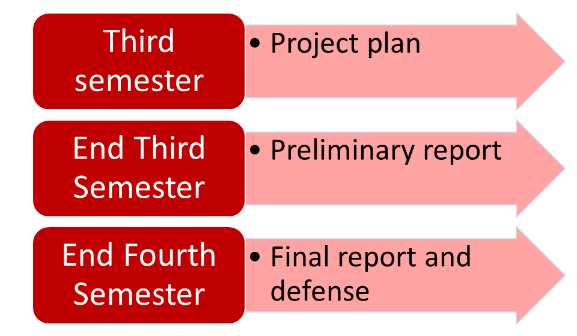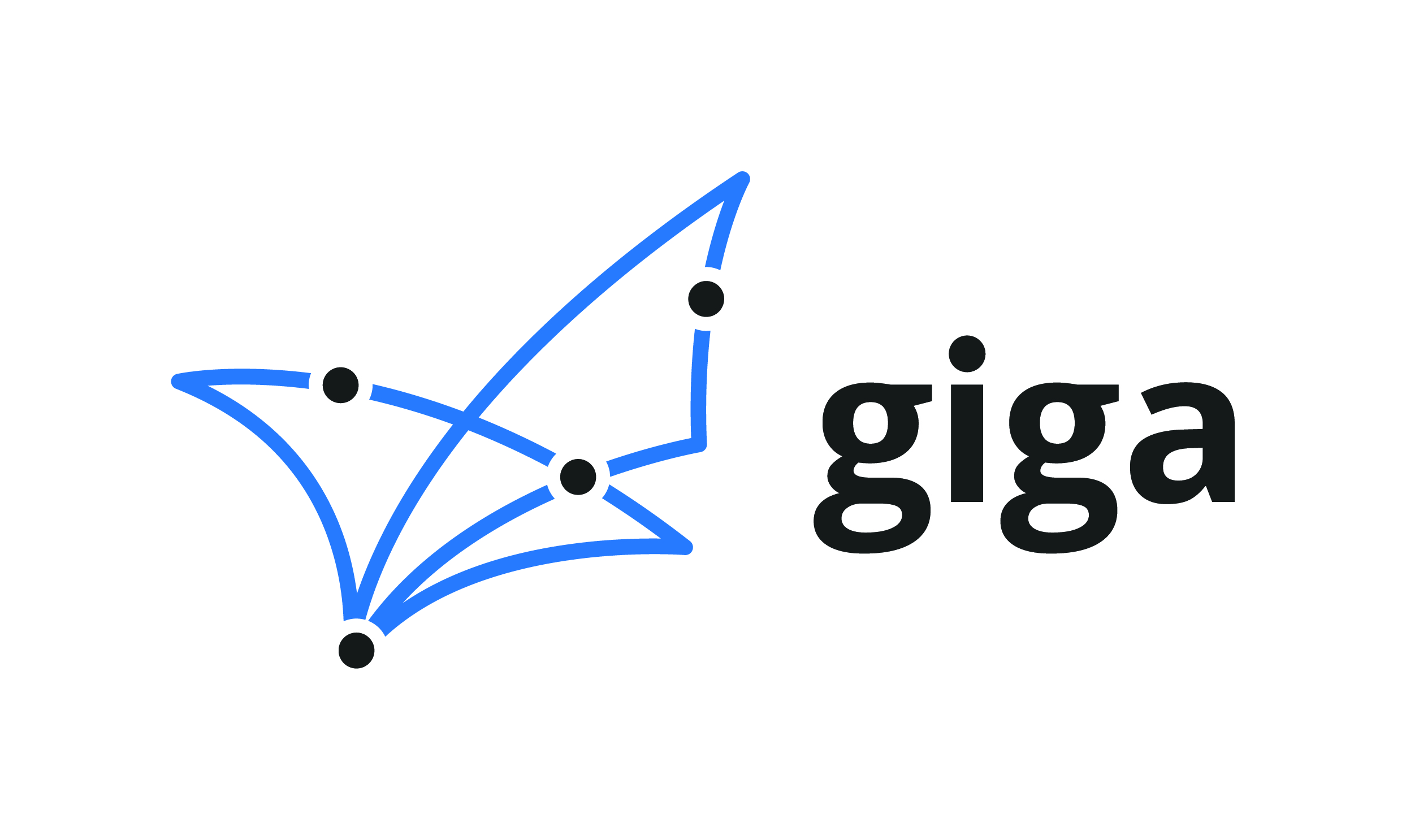The Master's Thesis
At the end of the first year, students will be able to choose the topic of their Master's thesis with the assistance of academic coordinators and write the first version of their Master's thesis project proposal. Students will primarily devote the fourth semester to the Master's thesis, working closely with the supervisor, either in an industrial or a higher education institution partner.
The Master's thesis project is a very important part of the Master's degree, including 30 ECTS, which represents 25% of the total of 120 ECTS. Students will have to identify a research hypothesis to be validated or disproved and address some important scientific challenge that will often require the development of a system. It is a mixture of practice in the design, construction and elaboration using scientifically sound methods and evaluation. The thesis work will be considered for submission to scientific conferences.
Calendar

Steps
-
During the third semester, students submit the project plan (approximately one page) containing the basic information about the project:
- Start date
- Expected end date
- Supervisor(s)
- Preliminary project title
- Tentative research questions or problems to be addressed
- Global work plan
-
At the end of the third semester, the preliminary report is due. Students submit a preliminary report containing detailed information about:
- Introduction
- Background
- Research questions or problems to be addressed
- Preliminary results
-
The final report is submitted at the end of the fourth semester, and the defense takes place. Students submit the final report to the EMAI Evaluation Committee and perform the oral defense in front of this committee.
Procedures and requirements
Evaluation Overview
The student's work is evaluated with regard to the following criteria (weights in parenthesis):
1. Written thesis report
a) Large-scale organisation (15%)
b) Figures and tables (15%)
c) Small-scale writing (15%)
2. Work attitude of the student
a) Assessment of the state of the art (10%)
b) Initiative in problem-solving (20%)
3. Oral thesis presentation
a) Presentation slides (10%)
b) Speech (10%)
c) Free discussion (5%)
Supervisors and Research Topics
Pompeu Fabra University
| Supervisors | Research Topics |
| Vincent Adam | Probabilistic Modelling, Reinforcement Learning, Optimization |
| Pablo Arias Martinez | Image and Video Restoration, Self-supervised Learning, Bayesian Estimation, Generative Models, Diffusion Models |
| Coloma Ballester | Computer Vision, Multimodal scene understanding from video, Unsupervised learning |
| Bart Bijnens | Cardiovascular Diseases, Clinical Decision Support, Manifold Learning, Multiple Kernel Learning |
| Miguel Calvo-Fullana | Reinforcement Learning, Constrained Learning, Multi-agent, Connected Autonomy, Optimization |
| Josep Font-Segura | Constellation Design for Optical Communications, Error Probability in 6G Wireless Communications, DNA-Based Storage, Deep Learning Information Theory, Signal Processing and Information Theory in Machine Learning |
| Vicenç Gómez | Reinforcement Learning, Automated Planning, Probabilistic Inference, Large Language Models, Social Networks |
| Gloria Haro | Computer Vision, Multimodal analysis, 3D Reconstruction, Sports Video Analysis |
| Davinia Hernández-Leo | Artificial Intelligence in Education, Learning Analytics, Learning Technologies, Human-AI collaboration, Human-Centred Computing |
| Anders Jonsson | Automated Planning, Reinforcement Learning, Exploiting Structure |
| Symbolic Reasoning, Neuro-symbolic Computation | |
| Rubén Moreno Bote | Natural and Artificial Intelligence, Computational Neuroscience, Reinforcement Learning, Decision Making |
| Gergely Neu | Reinforcement Learning, Machine Learning Theory, Sequential Decision making, Online Learning, Statistical Learning Theory |
| Miquel Oliver | Data Analysis and Prediction, Transport System, Blockchain |
| Narcis Pares | HCI, Mixed Reality, Embodied Interaction, Learning, Autism, Heritage |
| Gemma Piella | Medical Image Analysis, Computer Vision for Medical Applications, Explainability, Uncertainty Quantification, Generative models |
| Manuel Portela Charnejovsky | Privacy-preserving data-mining, Geospatial Data Modelling, Responsible Data Sharing Practices |
| Horacio Saggion | Natural Language Processing (NLP) for Good, Text Simplification & Accessibility, Scientific Text Mining, Artificial Creativity and Language Processing and Generation, Natural Language Processing for Sign Languages |
| Javier Segovia Aguas | Automated Planning, Reinforcement Learning, Program Synthesis |
Sapienza University
| Supervisors | Research Topics |
| Irene Amerini | Computer Vision, Fake Detection |
| Giorgio Grisetti | Probabilistic Robotics, SLAM |
| Luca Iocchi | Social Robotics |
| Domenico Lembo | Knowledge Representation Methods for Ontology-based Data access |
| Francesco Leotta | Robotics for Precision Agriculture |
| Andrea Marrella | Automated Planning |
| Massimo Mecella | LLMs for Supporting Software Development and Software Architecture Design, AI in Industry 4.0, AI and BPM - Business Process Management |
| Roberto Navigli | Multilingual Natural Language Processing |
| Fabrizio Silvestri | Deep Neural Networks |
Potential supervisors can also be any of the lecturers of the courses attended during the programme.
Radboud University
| Supervisors | Research Topics |
| Gunes Acar | Privacy, Web Security |
| Lejla Batina | AI for Cryptography, Implementation Attacks |
| Ileana Buhan | AI for Cryptography, Implementation Attacks |
| Joan Daemen | Cryptography |
| Martha Larson | Recommender Systems, Information Retrieval, Multimedia Analysis, Language and Speech Technology |
| Stjepan Picek | AI, Security of AI, AI for Security |
| Erik Poll | System Security |
| Hanna Schraffenberger | Human-computer Interaction |
Potential supervisors can also be any of the lecturers for the courses in the programme. Additional topics can be found here.
University of Ljubljana
| Supervisors | Research Topics |
| Zoran Bosnić | Artificial Intelligence, Machine Learning |
| Ivan Bratko | Artificial intelligence, Machine learning, Knowledge-based systems, Qualitative modelling, Intelligent Robotics |
| Tomaž Curk | Machine Learning, Bioinformatics |
| Luka Čehovin Zajc | Human Computer Interaction, Motion Perception Understanding |
| Janez Demšar | Machine Learning, Data Mining with Emphasis on Data Visualization |
| Jure Demšar | Neuro Informatics, Collective Behaviour |
| Jana Faganeli Pucer | Machine Learning in Environmental Science |
| Tomaž Hočevar | Machine Learning, Algorithms and Data Structures |
| Matej Kristan | Visual Object Tracking, Detection and Segmentation, Vision for Mobile Robotics |
| Matjaž Kukar | Machine Learning and Medical Data |
| Alan Lukežič | Computer Vision |
| Peter Peer | Computer Vision, Biometrics |
| Marko Robnik Šikonja | Natural Language Processing, Network Analytics |
| Aleksander Sadikov | Heuristic Research, Medical Decision Support Systems, Eye Tracking |
| Danijel Skočaj | Computer Vision, Machine Learning, Cognitive Robotics |
| Franc Solina | Computer Vision |
| Erik Štrumbelj | Probability, Statistics, Machine Learning |
| Lovro Šubelj | Network Science, Machine Learning with Graphs |
| Jure Žabkar | Artificial Intelligence |
| Slavko Žitnik | Information Retrieval, Information Extraction |
| Bojan Žunkovič | Machine Learning for Quantum |
| Blaž Zupan | Explainable AI, Machine Learning, Data Visualization |
Associated Partners
Contact person: Naroa Zurutuza
Contact person: Joan Mas-Albaigès


